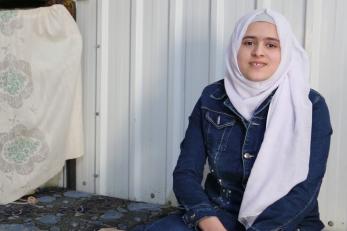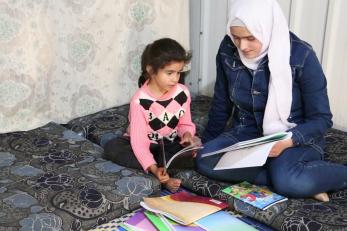Children's Day: Monera tells us her lifestyle and dream during COVID-19

Monera, 15 years old, fled from Dara’a to Jordan with her family in 2013. “When I came from Syria to here I was only seven years old. I only remember when the bomb hit my house and how the walls fell down to the ground,” she explains.
Monera has lived with her family in Za’atari camp for six years before they were relocated to Azraq camp in 2018. “ When we arrived in Azraq, I faced problems adapting to the new life here because I had built friendships in Za’atari camp,” Monera says.
Monera learned about Mercy Corps’ ISHRAK project through an outreach campaign conducted by the project volunteers. Ishrak (إشراك) is a family strengthening project that provides psychosocial support to fortify bonds between family members in stressful situations. Monera was excited to join the filmmaking program as she admires photography and has a dream to become a journalist one day.
“Joining filmmaking training was a milestone for me. I built new friendships, I learned how to make films and I was able to practice my hobby of taking pictures,” Monera said.

Monera is interested in reading and is always looking for news. She likes teaching others and aims to share her knowledge with everyone. Monera likes to express her opinions, she is a part of her school's press group and she always practices writing articles and news.
About ISHRAK
The ISHRAK project supports Syrian refugee families inside Azraq and Za’atari refugee camps. The program is providing creative ways for caregivers and children to connect, play, and build positive relationships. Each of the program components is designed to work together towards the broader goal of increasing family resilience to extreme stress and building an environment in which children are protected and able to thrive. By focusing holistically on all generations of the family, including elders and non-parental caregivers, the program supports the resilience of whole communities. The program draws on the latest evidence from neuroscience and attachment theory to underpin all activities.
In three family-friendly community centers in Za’atari and Azraq refugee camps, ISHRAK targets different age groups: children, adolescents and caregivers. ISHAK supports the physical, emotional and social wellbeing of individuals through a wide variety of activities. These include a safe space to play, cultural heritage lessons, art classes, filmmaking and parenting programs.
Due to COVID‑19 in Jordan, Mercy Corps had to suspend its activities inside the community centers in the camps. The project has been adapted to shift to online and digital activities.
The shift started with a rapid assessment in order to determine communities’ ability to access the internet as well as which platform works best for them in order to maintain constant communication and help them to face new challenges. Through two WhatsApp groups — one for female caregivers and one for males — ISHRAK provides methods and activities for positive parenting as well as different exercises to help parents and children cope with increased stress, all rooted in cognitive-behavioral therapy approaches.
The ISHRAK project is made possible by the generous support from Trip-Advisor, Source of Hope Foundation, The Republic of China (Taiwan) and SHELL.